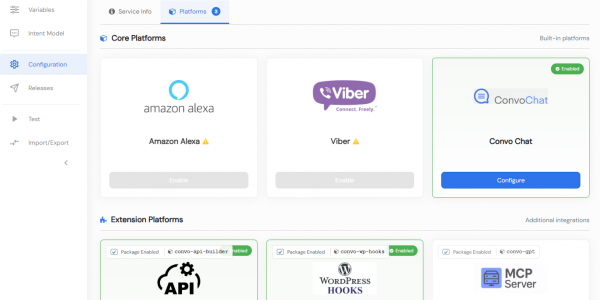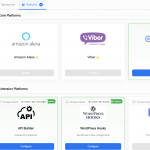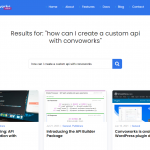
No‑Code Guide: Turn WordPress into an MCP Server with Convoworks WP
You’ve probably seen the buzz on X and elsewhere about the Model Context Protocol (MCP), Anthropic’s proposed standard for letting AI assistants (Claude, Copilot, etc.) call external tools and data. With the Convoworks WP plugin, WordPress users can now join the fun by spinning up MCP servers from a no‑code, web‑based interface—no TypeScript, no custom code.
What Is the Model Context Protocol (MCP)?
Think of MCP as a thin, JSON‑RPC layer that lets AI agents and your service speak the
same language. A connection starts with an initialize request in which
the client and server negotiate:
- Protocol version — ensures both sides understand the spec.
- Capabilities — each party advertises what it can do
(e.g. provide tools, subscribe to resources, emit logs). - Session ID — a stateful handle that lives for the entire
conversation.
After that handshake, communication flows over two channels: ordinary JSON‑RPC requests
and a long‑lived Server‑Sent Events stream for server‑side notifications. What gets sent
across those channels is completely up to you, courtesy of three extensible MCP
primitives:
| Primitive | Purpose | Convoworks WP |
|---|---|---|
| Tools | Callable functions the AI can invoke (REST endpoints, PHP helpers…) | Available ✓ |
| Prompts | Reusable templates the client can fetch and fill with arguments | Available ✓ |
| Resources | Read‑only data addressed by URI (files, DB rows, etc.) | Coming soon ⚠ |
Because MCP only standardises the envelope (sessions + capability exchange),
developers are free to invent any tool, prompt, or resource shape that suits their app.
In the initial Convoworks WP implementation we focused on:
- Tools — exposing both ad‑hoc chat functions and the full WP REST API.
- Prompts — letting you register parameterised prompt templates.
Resource support is already on the roadmap and will drop into the same no‑code editor as soon as it lands.
Installation & Setup
To turn your site into an MCP server:
- Install Convoworks WP from the downloads page.
- Install the Convoworks GPT package – download the latest release from GitHub.
- Create a new service and pick the MCP Server Example template.
- Open Configuration → Platforms, enable MCP Server. Here, you can also enable basic authentication. If enabled, it will utilize WordPress application passwords.
- Under Releases, click LINK next to
convo-gpt.mcp-serverto copy your base MCP URL. - Paste that URL into any streamable HTTP capable client (e.g. Claude Desktop with
mcp-remote).
Video Tutorials
Run an MCP Server on Your Site: Pure WordPress, Zero TypeScript
Highly recommended — the quickest way to see MCP in action.
This walk‑through shows how to spin up an MCP server from the ready‑made template, enable the platform, connect Claude Desktop, and test WordPress REST calls—all without writing any code.
Turn Your Convoworks WP Chatbot into an MCP Server — Agent‑to‑Agent Style
Perfect if you want to dive deeper: learn how to modify Convoworks services, add new functions, and understand what MCP really offers.
Starting from the GPT Site Admin template, this video shows how to add an MCP Server block, reuse call_user_func_array(), and create a single ask_website_admin(query) function that streamlines AI interactions in an A2A (agent to agent) way.
WordPress REST API as MCP Tools
Convoworks GPT ships with built‑in definitions that expose the entire WP REST API as MCP tools.
Each endpoint family is activated through its own filter, letting you enable only what you need.
See Example 3 – External Functions in the MCP Server Example template for a live demo.
Available Filters
convo_mcp_register_wp_posts,
convo_mcp_register_wp_pages,
convo_mcp_register_wp_comments,
convo_mcp_register_wp_users,
convo_mcp_register_wp_media,
convo_mcp_register_wp_plugins,
convo_mcp_register_wp_taxonomies,
convo_mcp_register_wp_settings
Stdio-Only Clients? Use mcp-proxy
Some desktop clients (e.g. Claude Desktop) speak stdio rather than streamable HTTP.
Bridge them with the mcp-remote:
Add a block to your claude desktop config:
"convoworks-proxy": {
"command": "npx",
"args": [
"mcp-remote",
"http://localhost/wordpress/wp-json/convo/v1/public/service-run/external/convo-gpt/mcp-server/a/mcp-prototype",
"--transport", "http-only"
]
}Or with basic authentification:
"convoworks-proxy": {
"command": "npx",
"args": [
"mcp-remote",
"http://localhost/wordpress/wp-json/convo/v1/public/service-run/external/convo-gpt/mcp-server/a/mcp-prototype",
"--transport", "http-only",
"--header",
"Authorization:${AUTH_HEADER}"
],
"env": {
"AUTH_HEADER": "Basic YOURBASE64ENCODEDKEY"
}
}Advanced Configuration & Security
The plugin offers several constants you can override in wp-config.php before plugins load:
// Where session files are stored (filesystem for now, DB soon)
define('CONVO_GPT_MCP_SESSION_STORAGE_PATH', '/path/to/mcp-sessions/');
// How long an idle session lives (seconds)
define('CONVO_GPT_MCP_SESSION_TIMEOUT', 1800); // 30 min
// Poll interval for new messages (microseconds)
define('CONVO_GPT_MCP_LISTEN_USLEEP', 300000); // 0.3 s
// Ping heartbeat to keep background process alive (0 = disabled)
define('CONVO_GPT_MCP_PING_INTERVAL', 30);
Session storage is currently file‑based under CONVO_GPT_MCP_SESSION_STORAGE_PATH; a future release will migrate sessions to the database.
MCP Server Example – Service Variables
- MCP_ACTIVE_REST_APIS (default
["convo_mcp_register_wp_posts"]) — list of filters to register as tools.
Roadmap
-
Complete 2024‑11‑05 spec parity
Finish the remaining features from the original MCP spec:- “tools/list_changed” notifications
- Full prompt‑template workflow
- Resource listing & read support
-
Switch session storage from files to DB
Faster look‑ups, better concurrency, and easier scaling. -
Adopt MCP v2 (2025‑03‑26)
Add capability batching, streamable HTTP transport, and OAuth 2.0 authorization.
Conclusion
MCP support in Convoworks opens the door to deeply integrated, tool‑calling AI assistants inside WordPress. With a no‑code editor, you can expose REST endpoints, PHP functions, or entirely custom workflows to any MCP‑aware client.
Ready to dive deeper? Check the Convoworks docs or explore the code on GitHub.
Related posts

Convoworks WP 0.24 – A Faster, Cleaner Editor on the Road to Version 1
Convoworks WP 0.24.00 enhances the editor with faster navigation, improved component search, and refreshed help documentation. It introduces secure API key storage and service management improvements, while refining the editor’s design for better usability. Deprecated platforms have been removed to streamline the core.
VIEW FULL POST
Convoworks, 2025 – Status and Next Steps
Convoworks started as a voice-workflow tool, survived the collapse of smart-speaker hype, and is now evolving into a modular, AI-first framework for WordPress. This update explains the cleanup in progress, the move toward agent infrastructure and natural-language building, and how you can follow along while v1 takes shape.
VIEW FULL POST












